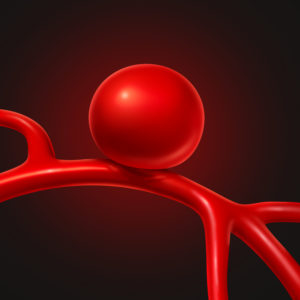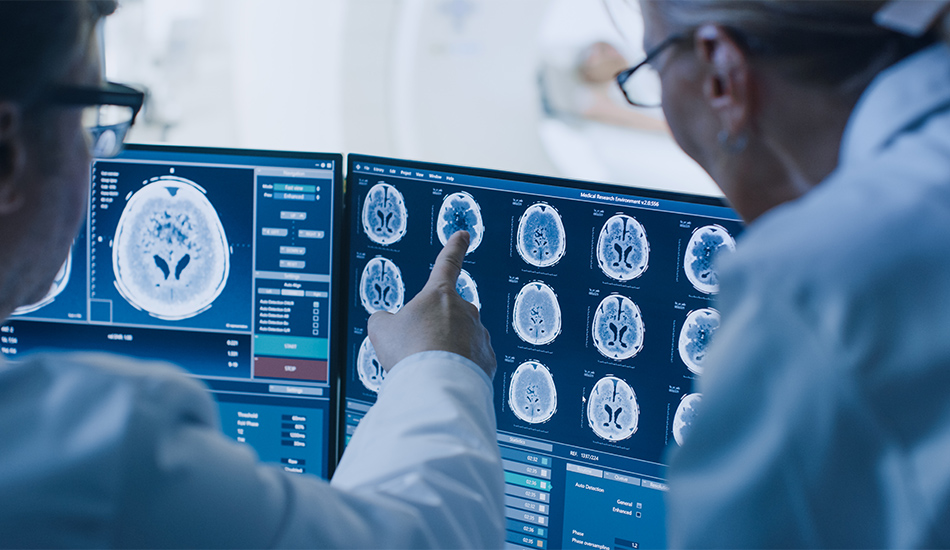A ruptured brain aneurysm can be life-threatening and is certainly terrifying. According to the Brain Aneurysm Foundation, ruptures occur in about 30,000 people in the United States each year, and 40 percent of these cases result in death within 24 hours.
Contrary to general public belief, a brain aneurysm itself is not what leads to the need for immediate medical care. A brain aneurysm becomes detrimental when it ruptures, leading to bleeding. Having a brain aneurysm in itself can be dangerous as well, however, because it can cause pressure on other areas of the brain when it enlarges.
Aneurysm Defined

A brain aneurysm is a bulging area in an artery in the brain, similar to a thin balloon. It becomes life-threatening if it ruptures.
A brain aneurysm is a weak, bulging area in an artery in the brain, similar to a thin balloon. Because the walls are weak, an aneurysm is at risk of rupturing. If it ruptures, blood spills into the space between the skull and the brain. This is a serious type of stroke called a subarachnoid hemorrhage.
If someone experiences a ruptured brain aneurysm, it’s vital that you call 911 immediately. Do not drive the individual to a hospital, as paramedics may need to implement life-saving methods en route.
There are two types of brain aneurysms.
- A saccular aneurysm is the most common. It is sometimes called a “berry” aneurysm because it looks like a berry. These are connected to the main artery and bulge only on one side of the artery.
- In a fusiform aneurysm, the artery is widened on both sides.
Causes of Brain Aneurysms
In some cases, individuals can reduce their risk of getting brain aneurysms, as they can develop as a result of genetics and nature as well as environmental factors. They are more common in women than men, and they are more likely to affect individuals over the age of 40.
Some of the controllable risk factors and causes of brain aneurysms include:
- Smoking
- High blood pressure
- Drug use, particularly cocaine
- Excessive alcohol use
In addition to family history, gender, and age, additional correlations include the presence of other disorders. As stated on the Brain Aneurysm Foundation website, these include:
- Ehlers-Danlos syndrome
- Autosomal dominant polycystic kidney disease
- Marfan syndrome
- Fibromuscular dysplasia
- The presence of an arteriovenous malformation
- A congenital abnormality in the artery wall
Infection and severe head trauma also are common causes of brain aneurysms and their potential rupture.
Treatment
Insight Surgical Hospital’s core focus is on neurosurgery and neuroscience, enabling us to treat brain aneurysms and other brain surgeries with incomparable skill and experience. Aneurysm treatments have greatly advanced in recent years, and prognoses often look promising.
Treatment options include open surgery, wherein a metal clip is placed across the base of an aneurysm so that blood cannot enter it. Another is endovascular therapy, where coils, stents, or flow diversion devices are used.
If the individual is not experiencing symptoms, an additional option is no treatment at all. In this case, doctors should monitor the aneurysm closely, and patients should be aware of signs indicating that the aneurysm is getting larger.
Ruptures
When an aneurysm ruptures or bleeds, it can be equated to a balloon that has been over-inflated.
High blood pressure is believed to be the leading cause of aneurysm ruptures. Other possible causes include heavy lifting or straining that causes pressure in the brain, the use of blood thinners and certain other prescription medications, and the use of illicit drugs such as cocaine.
Signs of a ruptured aneurysm include:
- A sudden and dramatically severe headache
- Nausea/vomiting
- Stiff neck
- Blurred or double vision
- Seizure
- Drooping eyelid
- A dilated pupil
- Pain above and behind the eye
- Confusion
- Numbness
- Loss of consciousness
If someone you know experiences one or more of these severe symptoms, call 911 immediately.

